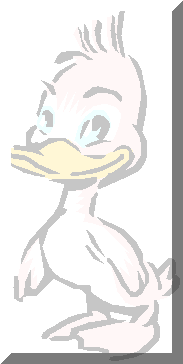

|
|

|
 |
Prepositions are
connecting words
used to show the relationship
of one word to another.
The word preposition means placed before.
It is so named because it is
usually
placed before a noun or a pronoun or a
noun phrase
or a clause.
Prepositioner har som uppgift att ange en relation mellan ett substantiv
eller pronomen och ett annat ord.
Prepositionen är vanligen placerad före substantivet.
Prepositioner anger ofta riktning eller befintlighet/läge för ett substantiv.
Prepositionsexempel - Sample Prepositions:
av, för, åt, till, från, mot, längs, ovanför, nedanför, bakom, på,
i, under, över/ of, along, above, below, from, toward/-s,
behind, for, to, on, in, under,
during, over etc.

OBS! prepositioner
används
mycket olika i olika språk.
Även om ibland "på" kan motsvara "on" så kan man icke räkna med att det
skall vara "on" i engelskan
där man i motsvarande position i svenskan använder "på"!
-Denna omständighet kan aldrig tillräckligt betonas!

Prepositions are connecting words
used to show the relationship of
one word to another.
The word preposition means placed
before.
It is so named because it is
usually placed before a noun or a pronoun
or a noun phrase
or a clause.
Prepositioner har som uppgift att
ange en relation
mellan ett substantiv eller
pronomen och ett annat ord.
Prepositionen är vanligen placerad
före substantivet.
Prepositioner anger ofta riktning
eller befintlighet/läge för ett substantiv.
Prepositionsexempel - Sample
Prepositions:
av, för, åt, till, från, mot,
längs, ovanför, nedanför, bakom, på, i,
under, över/ of, along, above,
below, from, toward/-s,
behind, for, to, on, in, under,
during, over etc.
OBS! prepositioner används mycket
olika i olika språk.
Även om ibland "på" kan motsvara
"on"
så kan man icke räkna med att det
ska vara "on" i engelskan
där man i motsvarande position i
svenskan använder "på"!
-Denna omständighet kan aldrig
tillräckligt betonas!

interested in=
intresserad av
be on time=
vara i tid
come on Friday at noon= kom på fredag
klockan 12
a head-on collision= en frontalkrock

IMPORTANT
Det finns enkla och
sammansatta prepositioner.
Ibland hänvisas i grammatisk facklitteratur till 'Single' or
'Simple Prepositions' & 'Compound' or 'Complex Prepositions'.
Har du för avsikt att ägna särskild tid och kraft åt studier av
prepositioner så bör du vara bevandrad i terminologin
alternativt du kommer inte att få ett tillräckligt underlag för en
fördjupning i ämnet.
Svensk litteratur i ämnet engelska med inriktning på prepositioner
är inte alltid särskilt uttömmande.
There are single (simple) and compound (complex) prepositions.
Make sure you are aware of the somewhat confusing terminology.
See below!
Complex
(compound) prepositions consist of two- or three-word combinations
acting as a single unit.
Look at these
2-word combination examples: according
to, along with, apart from, because of, contrary to,
due to, except for, instead of, prior to, regardless of.
3-word combinations might look like this: Single
(Simple) Preposition + Noun + Single (Simple) Preposition.
in
aid of, on behalf of, in front of, in accordance with, in line
with, in relation to,
with reference to, with respect to, by means of.
These combinations also come
before a noun.
In some grammars they like to describe the types as being of basically three (3) kinds: simple, compound and phrasal.
Simple: at, in, of, on
Compund: alongside, throughout, underneath
Phrasal:
across from, in place of, near to
It is important also to grasp the fact that a prepositional
phrase
(incl prep, the object of the prep, and the modifiers of the obj)
may function as an adverb or an adjective.
The main thing here is that you really
understand the role and the function of the preposition by and
large.
Then
there is of course the category mostly referred to as
Marginal Prepositions.
They have affinities with other word classes. Some are in verbal
form:
Following her resignation she
moved to the country.
The whole team
was there, including Debbie and Karen.
Other marginal prepositions are: concerning, considering, excluding, given, granted & pending.
Non-verbal marginal prepositions include
worth (it's worth three dollars)
and minus (twenty-three minus twenty is three)

What then?
in the morning= på morgonen
in the evening= på kvällen
MEN at night= på natten
at noon= på midda'n (kl 12:00 am)
vänta på= wait for
wait on= servera/betjäna bord, matgäster etc.
-Jämför - Compare "Jump in the water" med - with "Jump into the water"
and then translate into
Swedish!
Finally,
there is one more thing
having to do with prepositions and
terminology:
Stranded Preposition,
meaning it is placed somewhat off from it's more regular place
ahead of and before
the noun: "That is the girl Vince talked about."
 |
 |
|
|
|
 |
|
 |
|
|

© Swengelsk, KB ® webmaster |
|
|
 |